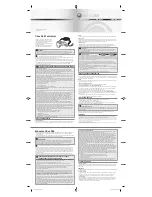
You have purchased one of the finest train controls available. This
transistorized power pack is one of the best buys for a high-balling model
railroader on a budget. The 300° speed control knob gives you smooth and
sensitive control of your locomotive. Everyone at MRC would like to wish
you Happy Railroading with your Railpower 1300!
INSTRUCTIONS
1.
Connect the
D.C. Track
terminals of your Railpower 1300 to the
track terminals, located on the right side of the Railpower 1300,
labeled on face of the unit.
2.
Connect the
A.C. Accessories
terminals of your Railpower 1300 to
any A.C. switch machines, lights, etc., that your layout might
contain. Located on the right side of the Railpower 1300, labeled
on face of the unit.
3.
Check your layout to make certain that there are no open track
sections or broken wires. Make sure your track is clean and free of
obstructions (tools, etc.) Be sure rolling stock is properly placed on
the track.
4.
Turn speed control to zero and move the power switch to the OFF
position.
5.
Plug the line cord into 120 Volts A.C., 60Hz house outlet and move
the power switch to the ON position.
6.
Turn speed control knob clockwise until desired speed is reached.
To reverse your locomotives, first stop them with the Speed
Control and then throw the
Direction Switch.
Failure to follow
these reversing directions may result in damage to your locomotive
and power pack.
7.
If a short circuit or overload should occur, the circuit protector in
your Railpower 1300 will trip and begin to cycle (turn on and off
rapidly). Should this occur, turn off the unit, correct the source of
the short or overload, allow 2 minutes for the circuit protector to
cool, and turn the unit back on. If the circuit breaker still cycles,
you have either failed to correct the source of the overload or have
not allowed sufficient time for the circuit breaker to cool.
PARENTS PLEASE NOTE:
As with any electrically operated unit, it is best to periodically examine it
and have any potentially hazardous part replaced or repaired.






















